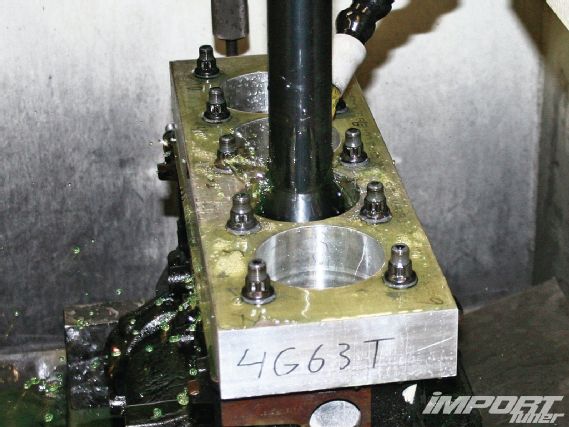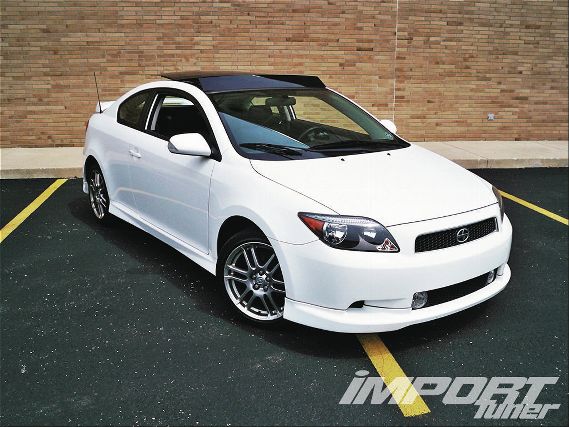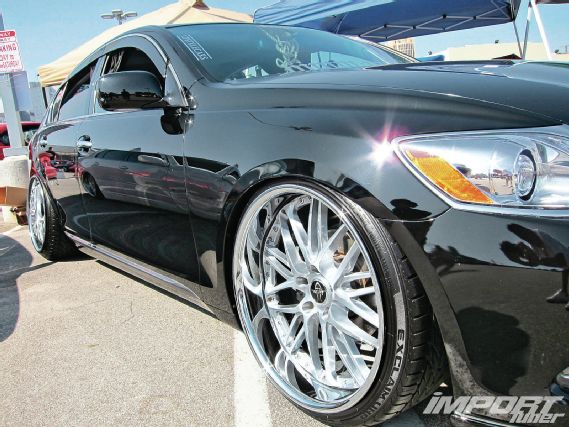Amazing and unknown facts on Eric Hsu:
Fact No. 1: Eric has owned 19 cars since the age of 16. In case you’re wondering, here’s a long list of both his past and present cars:
 |
Torque Plate - Question It
|
Torque Plate - Question It
’86 Oldsmobile Cutlass Sierra
’82 Mazda RX-7
’86 Mitsubishi Starion
’87 Turbo 2 RX-7
’69 Mazda R100
’73 Mazda RX-3
’90 Toyota Supra Turbo (MA70)*
’93 and ’94 Mazda RX-7 Twin Turbo
’85 Toyota Celica Supra (MA60)
’91 Nissan Skyline GT-R (R32)
’93 Nissan Skyline GT-R (R32)*
’89 Nissan 240SX (S13) KA24 Turbo
’91 Nissan 240SX (S13)*
’00 Lexus GS300 Turbo
’02 Subaru Impreza WRX
’03 Mitsubishi EVO VIII
’96 Nissan Maxima*
’00 Mercedes-Benz CLK*
’87 Toyota SR5 Truck
*Denotes the cars he currently owns
Got a good one? Send it to questionit@importtuner.com
Torque Plate
I am in the process of rebuilding a 6G75 V-6 motor for my ’08 Eclipse GT and happened to come across your “Top Seven Engine Building Tips” (June ’11) article. I am an active member of the 4G Eclipse forums and some people say a torque plate isn’t necessary. I’ve seen them used in numerous magazine builds and my machinist highly recommended it as well, so I spent the extra $500 to have a custom one made. Was this a good investment? Also, how important is it to have the same head gasket installed while honing? Head gasket selection was another big item on your list, but once again, none are available for this platform. We used a stock head gasket because a custom Cometic was going to cost $2,500, but I may have finally talked that company into making them for cheaper.
-Thomas Drak
via importtuner.com
 |
Torque Plate - Question It
|
Torque Plate - Question It
A torque plate isn’t needed if you don’t want maximum performance from your engine. If you do care about performance, then a torque plate is always a good investment for any high-performance engine build. When the head and gasket are torqued to a block, the bores will naturally distort since they are hollow cylinders. This is even true with open deck blocks. A torque plate simulates the cylinder bore’s distortion, thus allowing the machine shop to hone the cylinders with the simulated distortion. Honing with a torque plate generally yields better ring seal, compression, and can reduce oil consumption. Using a torque plate with the same gasket that will be used during final assembly is also a good idea whenever possible. A different brand or head gasket model might distribute the sealing force around the cylinder in different locations and distort the cylinder differently. You also want to use the same studs or bolts that will be used during final assembly since different fasteners will have a different clamping force. I don’t know too much about the 6G75 head gasket, but unless the factory head gasket is a known weakness of the engine, I would hesitate to replace it with a gasket that has zero development or engineering behind it. As an example, at Cosworth we fine-tune each gasket design for each engine because we’ve found that one generic design doesn’t quite do the job. Sometimes a generic gasket design can do more harm than good by introducing new issues or actually reducing the sealing force around the cylinder.
Sputtering tC
My wife owns an ’06 Scion tC with additional bolt-ons, including a generic cold-air intake, DC header, and MagnaFlow cat-back exhaust. Her tC recently experienced problems and would randomly start to sputter and die. It seems to only happen upon refueling. The level of fuel in the tank varies between mid level and a quarter tank upon fill-up. Whether she fills the tank completely or just adds $10, there seems to be no cause that ties it all together—except that it only happens when she fills up. The car refuses to hold idle, or it will have a very low idle and then suddenly die even when she presses on the accelerator. As I said before, it does not happen often, but it’s enough to worry me as I am in Afghanistan and can’t do anything about it until I redeploy. Do you have any recommendations? She can get down and do the work herself so throw any advice you can.
-Jon
Afghanistan/Orlando
 |
Torque Plate - Question It
|
Torque Plate - Question It
It’s always tough to diagnose a problem when the car isn’t in front of you. One thing you didn’t mention was if the check engine light (CEL) was on or not. Typically with this kind of problem, the CEL should pop up. Even if the CEL goes away, usually the code is kept in memory allowing an OBD-II scan tool user to diagnose even intermittent problems. Otherwise, it sounds like a vacuum leak to me. The first thing to do is to trace all of the vacuum hoses to make sure they are connected and do not have any cuts or tears in them. Aside from a physical hose being disconnected or torn, the generic cold-air intake sounds suspect. I’d recommend having your wife reinstall the factory airbox and air filter as the second step. Legit cold-air intake manufacturers like K&N actually do all of the development and testing so you won’t have any problems like this. We’re assuming the generic cold-air intake you have has had no development or testing. Modern cars are very sensitive to changes in the intake tract so I always recommend sticking to a big-name intake system. If she reinstalls the factory airbox and the car still doesn’t run right, there’s always the Scion dealership (or trusted local mechanic). If you want her to have minimal hassle, send her to the dealership and they should be able to get it running right again.
Airbags vs. Coilovers
My dad and I are teaming up on building a Nissan 350Z. Unfortunately, we have been arguing on coilovers versus airbags. He’s a muscle car guy but has owned Zs in the past so we agreed to do this 350Z. His old-school mentality is blinding his vision into building this car as he’s been surrounded by muscle cars on airbags and loves how you can slam them and raise them back with a flip of the button. Now I understand ’bags are starting to get more popular in the tuner world and can appreciate them, but I also know you can slam your car on coilovers and also tune them for the track. The big argument we have is that ’bags aren’t good for performance, yet he argues that he’s seen muscle cars road race on ’bags, plus his older body can’t handle the bumpy ride—although I can deal with it. How do airbags stack up to coilovers in terms of performance and is there a dramatic difference in performance between the two? Lastly, if you had to choose on a particular set of coilovers, which brand would you suggest that are as smooth as ’bags on regular roads but still can perform well on the track?
-Anthony Panzica
via importuner.com
I’ve definitely never seen airbags on any race car from a near stock Grand Am ST car to NASCAR to a F1 car. Airbags are really for cruising and the rear of cars or SUVs that spend some time towing (for ride height adjustment). So if you’re building a street car, want a comfortable ride, and want to be able to adjust ride height fairly quickly, then ’bags are for you. If you’re looking for a serious performance increase, then you’ll probably want to go the coilover route. The thing about coilovers is that adjusting the ride height can be a chore since you’ll need to lift the car and sometimes remove wheels to make ride height adjustments. Whether you adjust ride height with ’bags or coilovers, you’ll still need to address the alignment situation. Raising or lowering a car is fine and dandy, but the alignment will change drastically when doing so. From a cruising standpoint that might be fine, but from a performance standpoint, it’s going to make your car handle poorly. Also, you’ll need to deal with excessive tire wear until you optimize your alignment. So the moral of the story is that making ride height changes on a daily driven street car isn’t really too practical unless you’ve got a big budget for tires.
 |
Torque Plate - Question It
|
Torque Plate - Question It
I don’t think coilovers that ride as smooth as ’bags exist, but there are coilovers that were designed expressly for street-driven cars. The Tein Street Basics, Eibach Pro-Streets, and KW Suspension Street Comforts come to mind for quality coilovers designed specifically for the street.
